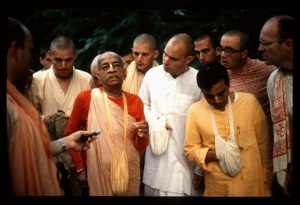CC Madhya 9.310 (1975)

A.C. Bhaktivedanta Swami Prabhupada
Below is the 1996 edition text, ready to be substituted with the 1975 one using the compile form.
TEXT 310
- tāpī snāna kari’ āilā māhiṣmatī-pure
- nānā tīrtha dekhi tāhāṅ narmadāra tīre
SYNONYMS
tāpī—in the Tāpī River; snāna kari’—taking a bath; āilā—arrived; māhiṣmatī-pure—at Māhiṣmatī-pura; nānā tīrtha—many holy places; dekhi—seeing; tāhāṅ—there; narmadāra tīre—on the bank of the river Narmadā.
TRANSLATION
Śrī Caitanya Mahāprabhu next arrived at the banks of the river Tāpī. After bathing there, He went to Māhiṣmatī-pura. While there, He saw many holy places on the banks of the river Narmadā.
PURPORT
The river Tāpī is also known as Tāpti. The river’s source is a mountain called Multāi, and the river flows westward through the state of Saurāṣṭra and into the Arabian Sea.
Māhiṣmatī-pura (Maheshwar) is mentioned in Mahābhārata in connection with Sahadeva’s victory. Sahadeva, the youngest brother of the Pāṇḍavas, conquered that part of the country. As stated in the Mahābhārata:
- tato ratnāny upādāya purīṁ māhiṣmatīṁ yayau
- tatra nīlena rājñā sa cakre yuddhaṁ nararṣabhaḥ
“After acquiring jewels, Sahadeva went to the city of Māhiṣmatī, where he fought with a king called Nīla.”